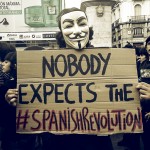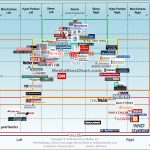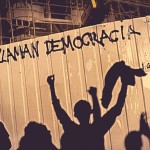The New Sit-ins are a Hashtag
The recent uprisings in Tunisia and Egypt have rekindled the discussion about the role of social networks, and triggered a speech by Secretary Clinton about Internet freedom. The speech emphasizes that it is the people who change regimes, but access to the Internet must be protected. Heedless governments continue to look for ways to restrict access and online anonymity, or even use the Internet as a weapon. Corporations look the other way when it comes to censorship.
The movement called the Orange Revolution in Ukraine made some use of cell phones, but its impact was very limited. In Iran (2009) the so called Green Movement spoiled the eagerly awaited Twitter Revolution. Those who argued that the social network factor was an illusion were mostly right. Even if there was a real movement among tweeters, it was foreign. The wish to see Teheran´s regime overcome by committed bloggers and tweeps was stronger than reality. But new events have unfolded recently…
In May 2011, the 15-M movement (spanishrevolution) grew in the midst of the European debt and unemployment crisis. Not surprisingly, the main players were not politicians, but “digital natives,” i.e. young people who grew up with ubiquitous Internet as an everyday reality. The #15M is homegrown, grass-roots movement, and going strong.
Mubarak´s government decided to block Internet access for several days at the beginning of the Tahrir Square protest. The purported reason was that activists organized themselves using social networks. Once access was gone, people tried to post telephone conversations using tweets to circumvent the blockade. Of course, mainstream media made the case that political changes are born in social networks.
During the “Spanish Spring” the 15-M started within social networks, pushed mostly by young activists, and it reached the public sphere when the Puerta del Sol in Madrid was taken by a cheering crowd. Citizens of all ages joined the movement to protest against a system they judge unjust. In a matter of days, the mass media gave the movement prime space, contributing thereby to the defeat of the ruling party in local elections. The organization and management of the 15-M crowds and sit-ins using social networks has been pitch-perfect.
Although it is true that technology by itself cannot change societies, it is also a fact that digital communication is power. It is power to maintain the status quo or change outdated structures, the power to spread ideas or suppress uncomfortable messages. Neutrality of technology enters the realm of political and social manipulation. And out of manipulation will emerge the character that social networks and the Internet may have in the future.
Every citizen with a mobile phone and/or an Internet connection is already a potential and probably effective political agent. Are we facing the “wiki-revolution”, a term used by Manuel Castells? I do not think that social movements follow the wiki´s mash-up logic, but they do follow the logic of efficient cooperation within the real and emergent possibilities of each person. Social networks make possible a political system with better capacity for reaction and mobilization. Availability of information in real time allows an autonomous assessment of political sentiment, in a system that I term a democracy with feedback.
With real-time politics, it is evident that a portion of the public space, and the discussion about political and social issues, have migrated to the social networks, where new minorities claim leadership and influence the natives. Those apolitical youths of yesteryear are now the “outraged” citizens of systems dominated by gerontocracies seeking to perpetuate the status. Because of them, a new form of democratic participation is slowly emerging, one that renounces representation or intermediation. Traditional politics has neglected the online public space. Here communication is less important, and the conversation matters.
In the Arab world, the increasing number of young people stripped of economic opportunities must endure governments that cling to power by tradition or through dictatorships (Egypt). In the European society, the decreasing number of young people carries the weight of a population that is ageing fast, but monopolizes power and excludes them from privileges (Spain). Fostered by inter-generational conflict, digital natives’ ideas and concerns flow into the public space in a different way. They don´t wait to be represented by local politicians or to be instructed by the mass media. Social networks are their chosen means of communication, organization and political action.
So, protests, riots and revolutions get that technology-driven tinge that causes perplexity. However, it is just the skepticism of the generation in power that faces the use of tools that they are barely starting to understand. Digital natives stand up to the TV and mass media generation. The sit-ins, the springs, the new Woodstocks may have become a hashtag.
Internet and politics is a combination with urgency and impact. Today it will have effects on how we understand freedom of speech: will it be guaranteed, if a person can be heard by millions at almost no cost or effort? It will also affect the Internet´s capacity to continue to be an open and innovative space. Any path seems possible: from a barlowian utopia of a cyberspace with no government or borders, to the fenced gardens of the realistic Jonathan Zittrain.
Our ability today to tolerate the anarchy of digital natives will define the social technologies that other generations will inherit. During the “eG8” summit in France the issue of imposing state controls over the Internet was already addressed, in an attempt to prepare the future for political control over cyberspace. Such a cyberspace would be devoid of the openness that enabled digital natives to spread their protests. But it will not only constrain the culprits, it will mean deterioration for civil society, commerce and innovation, regardless of age, creed or state. So, wake up, the new anarchy of the digital natives may be after all not a bad idea, we may have to learn to love the bomb.
Twitter: @ohowell







